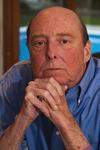 This article originally appeared in the July 5, 2009 (Morris County NJ) Daily Record and on the Daily Record web site.
This article originally appeared in the July 5, 2009 (Morris County NJ) Daily Record and on the Daily Record web site.
Boonton Twp. man offers support for pancreatic cancer patients
BY LORRAINE ASH • STAFF WRITER • July 5, 2009
BOONTON TWP. — After two kidney transplants — one in 1995 and another in 2004 — Dennis Disken of Boonton Township may have figured he’d had his share of medical trouble.
But in 2007 his stomach felt “off” and he was slightly jaundiced. The doctor ordered a CA 19-9 tumor marker blood test. Then a CT scan. And so Disken, in his 60th year, became one of the 32,000 Americans to be diagnosed with pancreatic cancer.

Pancreatic cancer survivor Dennis Disken, at his home in Boonton Township.
(STAFF PHOTO: WARREN WESTURA)
In a way Disken, a positive-minded guy, felt lucky. The jaundice tipped off doctors that something more serious than a flu was afoot (it turned out his tumor was blocking his liver).
He had only one option to remove the tumor from his pancreas, a gland behind the stomach that supplies the body with digestive enzymes and insulin. That was the Whipple procedure, in which surgeons remove the head of the pancreas as well as parts of the duodenum, bile duct and stomach to get at the tumor. After it is removed, they reconstruct the digestive tract.
Disken was thankful he qualified for the operation.
“Once the cancer has metastasized they can’t perform the Whipple,” he said. “Only one out of 10 patients can even have it. That’s the problem. Most of the time they find pancreatic cancer after it has spread to other parts of the body.”
That’s understandable because there is no screening test for the disease. Since the pancreas is hidden behind other organs, doctors can’t see or feel tumors during examinations, according to MedlinePlus. Symptoms of the disease — back pain, stomach pain, weight loss, fatigue — easily are attributed to other conditions.
But Disken’s Whipple failed. Surgeons found cancer cells in other areas around his pancreas and aborted the operation.
“My whole world crumbled a little bit,” he said, “because I thought I was going to be part of the bad statistics. Then I thought to myself, “Statistics are for losers. I’m not a loser. Why can’t I be at the good end of the statistical spectrum?’ ”
He proceeded to undergo chemotherapy and radiation. Now he gets no treatment because there’s none to get. Disken also works out five times a week at the local Y (a habit for more than 20 years) and runs the trucking and warehouse logistics company he’s owned the past 24 years.
But, oh, those statistics are formidable, he said:
Half of those diagnosed are dead in three months.
Three-quarters are dead in a year.
Four percent make it five years.
Death from pancreatic cancer can be very quick. Last August, 63-year-old Gene Upshaw, executive director of the NFL Players Association, was diagnosed on a weekend and died the following Tuesday.
The nature of the situation leaves those with pancreatic cancer without an important commodity: spokespeople. So Disken, 2 1/2 years in remission and more than halfway to being a “4 percenter,” is using the time he has to be just that.
“I’m an anomaly right now and I understand that,” said Disken, who joined the Pancreatic Cancer Action Network, or PanCAN, an organization devoted to advancing research and supporting patients. “I could get very upset or I could ask myself what I can offer of myself to help somebody else.”
He volunteers to speak one-on-one with the newly diagnosed (and their families). Who better, he figures, than a gregarious Catholic kid from Long Island to share information on clinical trials, new treatments, nutrition and diet?
He is one of three survivors to attend gatherings of the North Jersey affiliate of PanCAN, which meets monthly in Short Hills and comprises some 30 family members.
“Dennis is inspiring to us all,” said Nicole Trella of Parsippany, co-coordinator of the affiliate, which she joined in 2007 to work through anger and grief after her mother-in-law succumbed to the disease.
Disken and his wife, Linda, also lobby Congress to support legislation that increases research dollars for pancreatic cancer. Right now, he said, the disease seems to strike indiscriminately. But that’s only how it seems because no one actually knows much about pancreatic cancer, one of the top five cancer killers in the United States.
National Cancer Institute research funds for pancreatic cancer were $73.2 million in 2006 and 2007, according to Jennifer Reeves, PanCAN spokesperson. Last year $87.2 million was allotted, still a far cry from the amount spent on lung, colon and prostate cancers ($250 million to $310 million each) or breast cancer (close to $600 million).
How can Disken be silent about that? He can’t.
On one trip to Capitol Hill, he and his wife met Rep. Rodney Frelinghuysen, R-Harding, who supports The Pancreatic Cancer Research and Education Act (H.R. 745), which would require the secretary of Health and Human Services to create and carry out a Pancreatic Cancer Initiative. (The measure is still to be scheduled for a vote in the House of Representatives.) Frelinghuysen said the “scourge of cancer” touches most American families, including his.
Disken even found himself lobbying with the family of the late actor Michael Landon, who succumbed to pancreatic cancer at 54 in 1991, less than three months after diagnosis. Just as Disken inspires others by his activism, so is he inspired by family members who never forget their loved ones and keep working, in their memory, to eradicate pancreatic cancer.
In more private moments, Disken and his wife, a teacher, make sure every day they have is wonderful. For a while, they even joined a vacation-of-the-month club.
Disken spends zero time lamenting why he got pancreatic cancer in the first place. That’s no way to spend time. Besides, it’s a mystery. None of the few known risk factors apply to him: Pancreatic cancer is not in his family (10 percent of pancreatic cancers appear to be genetically relayed). He’s not of Ashkenazi Jewish descent. Or African-American. He never smoked.
He opted against a second Whipple procedure because he is immunosuppressed, which means his chances of complications are better than 50 percent. Why gamble when he’s in the middle of living what he calls the best years of his life?
More information about Pancreatic Cancer Action Network (including an Aug. 30 Newark Bears fundraising event at Riverfront Stadium) is available by visiting www.pancan.org. Dennis Disken can be reached at ddisken@absolut-mpd.com.
